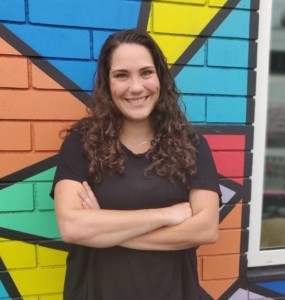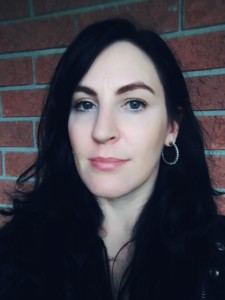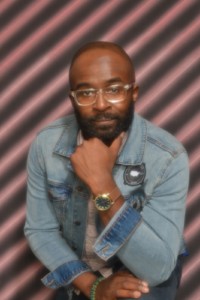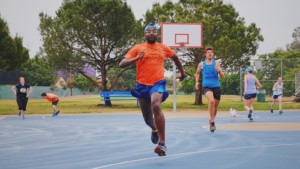Amanda Cupido is a Toronto-based podcast producer, Ryerson University instructor and author of Let’s Talk Podcasting: The Essential Guide to doing it Right.
I snap a picture of my desk to send to my best friend. There are two coffee cups, a set of headphones, and an audio file on the screen. The photo is timestamped 3:30 am.
“Classic” she responds, from her home in Guam—where it’s an appropriate time to be working. “Why do you always do this?”
I pause.

As a full-time, independent podcast producer, I’m frequently up until the early hours of the morning writing scripts and editing audio. Right now, I’m producing six different shows; for one of them, I’m also the host.
Why do I do this? Well, because I love it. I’ve been obsessed with podcasting for more than a decade and have always loved audio storytelling. But at what point does it become too much? I’m not afraid to admit that there have been times when I feel like I’ve been run into the ground and I question—is this worth it?
I know I’m not alone. Millennials have been called “the burnout generation” and burnout is especially prominent in the podcast scene, no matter your age. With the industry booming and a growing appetite for shows, it’s easy to get in over your head… which is why Kristi Lee caught my attention at the 2019 Hot Docs Podcast Festival in Toronto.
Burning out while podcasting on the side
Last year, I was fortunate enough to get speaking opportunities at the Hot Docs Podcast Festival and a storytelling conference in the Philippines. In classic burnout-triggering style, they were back to back. I had to go straight to the airport right after my Toronto gig. But as I was frantically packing up, I heard Lee talking about the 35 to 40 hours it takes for her to produce each episode of her show, Canadian True Crime, an independent podcast that covers local, heinous crimes. I remember her mentioning that she commonly deals with feeling burnt out. I appreciated her honestly; I had to follow up with her for this piece.

“I felt a lot of pressure from listeners who would ask when the next episode was coming and I took that and put the pressure on myself,” she says.
You see, Lee started her podcast as a side-hustle back in January 2017. It’s now her full-time job, but that was never the goal. As a fan of true crime shows, she says she was just responding to a gap in Canadian podcast content. She had no background in audio. Her initial goal was just to create one episode.
“Once I created that episode and realized it took me a lot longer than I thought, I decided to keep going because I really enjoyed it and the [listener] feedback gave me the confidence to keep going,” she says. But with a full-time job and two young kids, she decided to release about one episode per month. The podcast took off in popularity; the only negative reviews were from listeners who complained about her release schedule.
“I thought, well this is my passion project so there will be an episode when I can,” she says. “It’s a very time-consuming podcast to produce—both in the research and writing phase and also in the production phase.” Between commuting and working at her job, she’d be gone for 10 hours each weekday. She would then come home and spend time with her husband and kids until they went to bed. Only after that would she start working on the podcast. Eventually, she increased her release schedule to twice per month. “I’ve been burnt out ever since the beginning,” she says. “I’ve never not been burnt out. I’ve either been slightly or completely.”
Self-taught producers like Lee aren’t the only ones who get caught up with the pressure of a side-hustle podcast. People in the industry do too. I also have a personal project I produce on the side: a series called Lonely But Smarter. Yup, the website still says “coming soon.” It’s been that way for two years. I swear, I’m working on it….

John Asante knows the feeling. He’s the senior managing producer at Pineapple Street Studios and has been producing and hosting his own show, Play It Back, on and off since 2016. It started as a show that released once a month but is now a seasonal show that is currently on hold. “I would stay up to two or three in the morning, trying to finish [an episode],” he says.
Asante says it was difficult to stay motivated to take on the production, in addition to producing podcasts all day at work. “My mind is so warped at the end of the day from listening to podcasts and planning them. I always fear that doing my own podcast would feel like work and not play.”
The show is important to him: episodes feature musicians, creators, and music lovers talking about their most cherished music memories. He says that he’s dedicated to continuing the show because of a deep passion for sharing music, his stories, and the stories of other Black people and people of color.
“One of the biggest things that held me back was being super critical of my own skills,” he says. “I was very much like ‘I don’t want this show to sound like a run-of-the-mill chat show that’s recorded in a bedroom and basement.’ I wanted it to sound nuanced and amazing like Song Exploder.”
Asante says he was never good at banking episodes and started feeling anxious about keeping up with a regular release schedule. “I was embarrassed, to be honest,” he says. “I had friends encouraging me and I felt like I didn’t deliver.”
Podcasting as a full time job
At Asante’s day job, he’s usually producing two to four different shows with varying levels of involvement. He’s worked at podcast companies like Stitcher, Neon Hum, and now Pineapple Street Studios. His tasks are tied to both production and project management. That means he’s overseeing teams and deadlines, but also getting his hands dirty and cutting tape. Even without his side-hustle podcast, Asante says it’s a lot. “I get ingrained in projects at work… I never think of my job as a 40-hour-a-week job. Some [weeks] would be 50 or 60.”
Although he says Pineapple Street Studios champions a good work-life balance, he still has to work hard to maintain his personal boundaries. “I try not to answer any Slack messages outside of my [office] hours to reinforce that I’m not available,” he says. “But if it seems like something is on fire, then I jump in.”
But right when he thought he hit a good stride, the global pandemic made things more complicated. Asante says working from home all the time makes it harder for him to break away.
The pandemic also threw a wrench into Lee’s plans for a more manageable schedule. Earlier this year, she quit her job so she could focus on Canadian True Crime during the day and minimize working on it during nights and weekends. But two weeks later, the pandemic hit. Her daytime hours were then spent taking care of her kids and she was back to producing into the night. “I haven’t been able to get my life on track,” she says.
She credits her husband for his support but says that to her children (six and eight years old), the podcast is an abstract project. All they see is their mom disappearing into the basement at the end of each night.
Symptoms of burnout and how to cope
Lee says she’s found the symptoms of burnout to be very similar to depression. “I had problems sleeping and I was not taking care of myself,” she says. “I was having problems focusing and concentrating and it was hard for me to get started on a new episode. I really had to force myself.” She also noticed herself becoming more irritable and pulling away from social commitments. “I didn’t have the energy for it all.”
So she started trying to take time off over the summer and the holidays. On top of that, she started allocating time for mindfulness, yoga, and therapy. “In therapy, I’ve learned something so ridiculously simple: motivation doesn’t just come to you. You have to activate it. And it comes from taking action.” For example, Lee will write a list of tasks that need to get done and set up her space so there are no distractions. “[I] put on white noise in the background—even just the sound of a fan or nature sounds.”
Another thing she advises for podcasters dealing with burnout is to continue checking in with yourself and remember that you don’t have to continue if it’s no longer fulfilling. “While I had many times where I thought about seriously stopping the podcast, in the back of my mind I said, ‘One more year. One more year and if something hasn’t improved, then I’ll stop.’ Luckily, I got to the end of each year and I still had enough hope that I wouldn’t be dealing with this burnout for the rest of my life.”
For Asante, burnout can also manifest itself physically. “You’re not sick, but your body feels like it hasn’t got enough rest. Everything feels like a slog and that’s a sign that I need to take a break.”
In a workplace, he says it shows up when you’re not feeling supported and feel like you can’t take a day off. “You start to lose interest in the work you’ve been doing all along and then you start to question: ‘Is this the right fit for me? Is this worth doing? Should I keep doing it?’ You start to spiral [and] you start to question how good of a producer you are.”
As for his coping mechanisms, therapy has also been helpful, along with physical activity. He has always enjoyed running and now tries to get outside every morning before he sits down to start his work, especially during the pandemic. “I literally just signed up for a tennis lesson,” he says. “I’ve also been embracing walking around my neighbourhood… [and] checking in with friends more so than in the past.”

And if he starts to feel a hint of burnout, he takes a day off and cancels notifications on his phone so he’s not tempted to check what’s going on.
Dealing with burnout can be a constant struggle for many people, especially in the podcasting industry. So if you’re reading this and feeling spent—you’re not alone. Managing burnout is hard, especially when it’s tied to something you love.
Ironically, as I was writing this piece, it so happened that I felt like I needed a break. I figured there was no better time to put some of these tactics into action. I’m grateful for the week-long extension my Timber editor gave me; I used to feel bad for asking for a day off—let alone a week. But I knew I needed it.




Comments